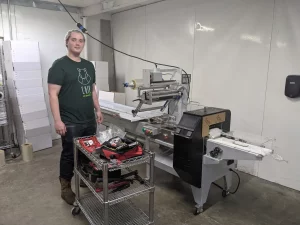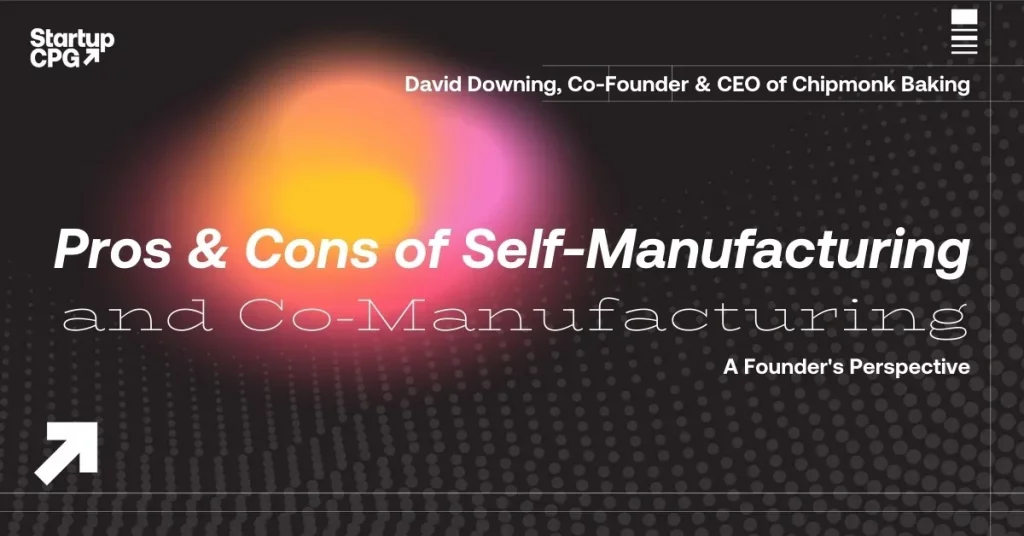Pros and Cons:
Self-Manufacturing vs. Contract Manufacturing
David Downingis the Co-Founder and CEO of ChipMonk Baking, a Houston-based specialty bakery that produces delicious low-carb, gluten free, keto, and diabetic friendly desserts. The company current self-manufactures their products but has also worked with contract manufacturers on larger orders.
 One key decision faced by early-stage CPG companies is determining where exactly their products will be made. There are two general choices: either make things in-house or outsource production to another company (typically called a contract manufacturer or “co-man”). Many factors come to play when making this decision such as:
One key decision faced by early-stage CPG companies is determining where exactly their products will be made. There are two general choices: either make things in-house or outsource production to another company (typically called a contract manufacturer or “co-man”). Many factors come to play when making this decision such as:
1. How complex or unique your product is
2. How much funding you have access to
3. How much volume you need to produce both now and in the future
4. Where you and your team’s strengths lie (i.e., are you marketing gurus, operations savants, or somewhere in between?)
If you are trying to figure out whether to make things in-house or externally, here are some pros and cons of self-manufacturing based on our experience at ChipMonk Baking.
The Pros of Self-Manufacturing
1. Flexibility – If you keep production in-house, it’s significantly easier to try out new things and to continually improve upon your products. Have a new flavor idea? It can be as simple as walking over to your production kitchen and whipping up a test batch. Want to know if you customers will dig it? It’s easy to do a small production run to sell prototype products and gather real feedback before launching them at scale.
2. Smaller runs = lower risk – With self-manufacturing, all of your eggs aren’t in one basket (or one big production run). You can spread your production out over days and weeks, and, if something goes wrong, it’s not going to sink the company in the same way that a huge contract manufacturing run gone wrong might.
 3. Consolidation – If you keep things in house, you have the opportunity to keep your operations, fulfillment, customer service, marketing, accounting, and other teams all under one roof. Communication is easier and you can build a real team culture. For smaller companies, employees can wear multiple hats easier as well (e.g., your production team could help with order fulfillment when needed and visa versa).
3. Consolidation – If you keep things in house, you have the opportunity to keep your operations, fulfillment, customer service, marketing, accounting, and other teams all under one roof. Communication is easier and you can build a real team culture. For smaller companies, employees can wear multiple hats easier as well (e.g., your production team could help with order fulfillment when needed and visa versa).
4. Sublease to other companies – If you have a large enough space, you can offset your rent by bringing in smaller companies to share it. This is a great tool for early-stage companies trying to watch their cash flow, and it is also a great way to build a strong local food startup community.
5. Increased profitability with scale – With relatively fixed overhead costs of your own facility, the more you can grow sales, the more profit you’ll be able to generate. When outsourcing production, higher volumes do not guarantee lower unit costs in the same way.
6. Smoother cash flow – When producing in-house, you don’t have to buy a huge chunk of ingredients and inventory all at once. You can produce as you need product, helping reduce the need for a ton of working capital.
7. Easier quality control – If your team is making the product, you can immediately catch issues and solve them before they mushroom into something worse. Contract manufacturers often work with many clients and may not have the knowledge or care to ensure the same level of quality control as you would like.

The Cons of Self-Manufacturing
1. High upfront investment needed – At ChipMonk, we spent nearly $200,000 build out our own commercial baking facility and warehouse with all the equipment we needed. To do this we had to raise money from investors. It wasn’t easy and may not be an option for all companies. One way to avoid this early on is to find a production space where you can sub-lease. In ChipMonk’s earlier days, we subleased a commercial kitchen space where we could use it during evenings and weekends for a significantly lower rent amount. This saved us a ton of money to help us build traction to eventually attract investors.
2. Higher overhead costs (labor, utilities, rent, insurance, supplies) – These things really add up and can be difficult to overcome when you’re just getting started.
3. Certifications are very expensive – if you’re products need certifications like Organic or Gluten-Free, getting them for your own small facility can be cost prohibitive. Most larger contract manufacturers will already have their certifications ready to go, saving you time and money.
4. Difficult to recruit and build your own team – Finding and retaining the right people is a huge challenge, especially in today’s economy. The bigger the team, the more complex and difficult it is. Building a strong team with a great culture can also be hugely rewarding, however.
5. Time and attention – As a founder, you will have to invest much more time and attention to keep operations running smoothly and efficiently. Things go wrong all the time, and you and your team are 100% on the hook to fix it. This can distract you from other critical activities like sales and marketing. If you don’t love operations and problem solving, keeping production in-house can be a major drain on your energy.
6. You don’t know what you don’t know – At first, your in-house processes will probably be inefficient until you learn best practices from experience or from mentors and professionals. I suggest you spend a lot of time networking with people who have been where you are trying to go. Reach out and learn as much as you can!
 Final Takeaways
Final Takeaways
Companies that self-manufacturer and companies that use contract manufacturers can both succeed or fail. Deciding which path to take really depends on you, your product, your teams’ strengths, and the financial realities you’re facing.
For the earliest stage companies, my recommendation is to always make your product yourself, when possible, for at least a year. Get into a shared commercial kitchen or maker’s space. Doing small scale batches will give you familiarity with your product and processes, which will benefit you whether you keep things in-house or eventually move to a contract manufacturer. Once you have some production experience under your belt, I think it just comes down to what you enjoy doing most. If you excel at sales and marketing, then contract manufacturing may be your best bet. If you love operations and team building, then keeping it in-house may be for you.
As a final thought, over time your decision can and will likely change. You can always morph into a hybrid model of self-manufacturing some products while outsourcing larger orders (we have started doing this at ChipMonk), or you could always bring production in-house down the road. Each step along the way is an opportunity to learn more so you can make better decisions in the future.






All Comments